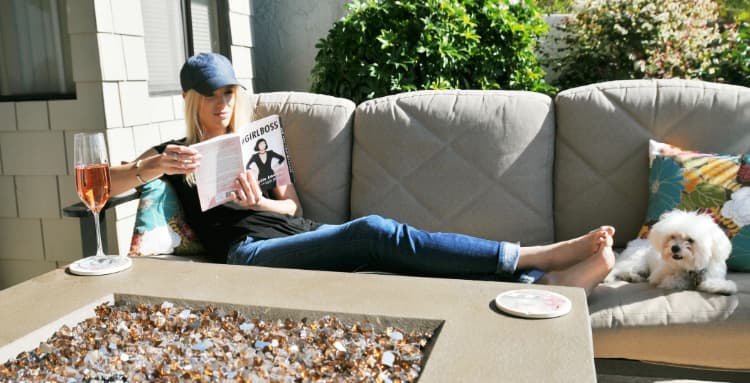
Detoxes aren’t just for resetting your digestive system after having too many In-N-Out burgers and margaritas. If you’re feeling a little insane in the membrane (like me with a pineapple on my head in the photo below), taking a social media break can be just what the mental health doctor ordered. Plus, Veronica Wheat, aka Chef V, has some tips to make social media, well, social and positive again…

We’ve all experienced it.
Checking our social media feed, we come across one post that for whatever reason stirs up feelings of inadequacy, jealousy, and even loneliness. Which is crazy because it’s called social media.
Maybe a friend from high school posted pics from an epic family vacation, staying at a 5-star resort. And meanwhile, you’ve been working your butt off and haven’t taken a vacation in years, let alone a glamorous one like your peers. Or maybe you come across a post where a bunch of your friends are out on the town seemingly having a blast but you didn’t get invited.
Whatever the reason, there’s no denying the fact that social media fuels anxiety and depression. A lot of research has been done over the past few years that concludes that social media can stir up some toxic sh!t in us. And just like we need to do a dietary DETOX from time to time, it’s a good idea for us to take a break from social media every once in a while. And rather than being on social media to keep up with the Kardashians, we can actually use it for good. I’ll share some ideas about how to do just that so keep reading…
Why We Use Social Media
If much of the news about social media is focusing on its bad effects on our mental health, then why do we continue scrolling? Why do we insist upon making ourselves feel potentially worse when we compare ourselves to other people? The simple answer is that we are social creatures and so social media, perhaps falsely, has led us to believe that connecting with our peer network has positive effects. But the paradox is that for many people, social media is an oxymoron, fueling even more disconnectedness.
Another reason 7 out of 10 adults and 8 out of 10 teens use social media is that social media is addictive. To our brains, social media is no different than a gambler chasing a jackpot. Or a sad person drowning their sorrows in a pint of ice cream. Or a dope fiend hitting the crack pipe.
When we scroll through our feeds, it feeds us a hit of dopamine. That’s the feel-good chemical that lights up the synapses in our brain’s reward center. The problem is that some people need more and more and more dopamine to stimulate this reward center.
Like a casino pumping fresh oxygen into the room and fueling gamblers with free coffee so they never get tired, social media platforms are designed to keep us coming back.
But why is that?
If we feel jealous or insecure about seeing certain posts, why do we keep coming back for more punishment? Where is the reward in that? Well, we just never know when the next hilarious cat video will tickle our fancy. The point is that one session of social media scrolling is never the same as the next. Sure, there may always be foodie and vacation pics.
But the experience is always different. And that’s what keeps us coming back for more.
Do You Like Likes?
Despite the potential harm to mental health, some people use social media because they want to feel validated. They need people to acknowledge their accomplishments (or vacation and foodie pics).
Although some platforms have removed likes (Instagram replaced likes with a heart emoji), that action does nothing to prevent comparing yourself to other people. And that includes comparing the number of, if not likes, then heart emojis your post received versus somebody else's.
It’s all silly, really, the folly and whims of human nature. And the people who design social media platforms are Dr. Evil’s when it comes to exploiting human psychology.
At the end of the day, we can’t help checking our feed to see if our post got any other likes (or hearts). This is part of the vicious cycle of chasing another hit of dopamine. And the first step to taking a social media detox is to realize you have a problem in the first place.
Got Social Media FOMO?
Another reason it’s hard for some of us to stop checking our feed—even though we know that it may fuel anxiety or other negative emotions—is because of FOMO. We have a fear of missing out on seeing a photo from high school that half your graduating class has commented on. What if you miss out on that one? It stirs up feelings of being excluded from certain activities when we were kids or being picked last.
Should You Detox From Social Media?
Look, if you know in your heart of hearts that scrolling is robbing you blind of joy then maybe it’s a good idea to take a break. Just like a Chef V CLEANSE has 1, 3 or 5 days options, you can start by dipping a pinkie toe in the deep end. Go one day without being on social media. See how that feels.
If you really want to feel lighter mentally, then I recommend going longer. Don’t let FOMO trip you up. You’ll be fine not looking at all your friends’ baby pics. You’ll come out of the experience with greater awareness of what’s really important to you. And, you’ll discover what truly makes you feel connected to spirit.

Make Social Media Social Again
If you decide to stay on social media, set some boundaries. Don’t check your feed an hour before bed or first thing in the morning. Instead, establish a spiritual practice and stick to it. Do 10 minutes of yoga or meditation morning and night instead of scrolling.
You can make social media social by inviting friends to join you for a yoga session in the park. Instead of following friends from high school that bring up feelings of inadequacy, follow thought leaders in the spiritual movement like Deepak Chopra. Organize a mini-meditation session with your “true friends” on social. Encourage everybody to comment about how they feel after meditating.
The bottom line is that if you’re going to check your feed for posts, it might as well feed your spirit. Follow others who you find to be inspiring, enlightening, and a positive for your mental health.
Conclusion
The truth is that rates of stress, anxiety and depression are up for reasons other than social media. But numerous studies suggest social media is fanning the flames of mental disharmony. Instead of chasing dopamine rewards by constantly checking your feed, spend more time in nature. Do more yoga. Meditate more. This is what will fuel your spirit.








